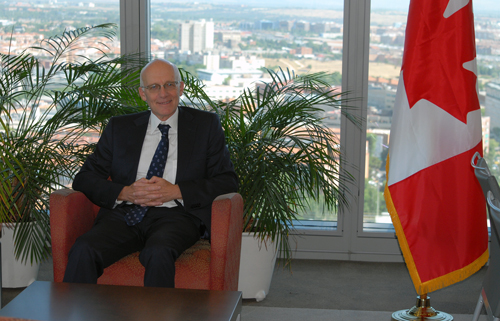Alberto Rubio, thediplomatinspain.com

Matthew Levin / Canada’s Ambassador
“With Spain there is a natural connection, but we do not know each other enough”, says Matthew Levin. The Ambassador of Canada does not hide that he is ‘hooked’ to Spain, where he already set foot in 1975 as a student of literature.
What did you think when you arrived?
In 1975, Spain was really another country. If you think about that and look at it today, the change is impressive. I do not believe that many young people can understand the deep transformation of this society in all aspects.
From the first moment I loved Spain and certain elements of its character that, in spite of time, have not changed: kindness, cordiality, interest for the foreigner. Madrid continues to have that human quality.
It is true that traveling through villages I noticed less development. Mules, donkeys, horses. That impressed, coming from Canada. And the trip from Madrid to Barcelona by train lasted 11 hours. It is said soon!
Now I try to travel a lot. Spain is a very diverse country and my intention is to visit all the autonomous communities to create stronger links.
Sometimes that diversity has led to territorial political crises in both countries. However, it seems that Canada has solved it better.
Canada has its own experience and we never consider ourselves a model for anyone. Part of the work of the Embassy has been to create spaces to exchange experiences and reflections on territorial realities. Both countries have, by our histories, territories with independentist aspirations. But the reality of each one is different and we can not take the experience of one country and apply it to another.
Currently in Canada the debate is not active. In Quebec, people is thinking about other things. On the contrary to Catalonia. In any case, it is a complex debate. There are no easy recipes. But our experience has shown that you have to deal with these situations that may never disappear.
What we do not have to share is the problem of immigration.
In the European Union immigration is an important issue. In Canada it is different because we are a country created by migrations from all over the world and almost all Canadians assume that they come from somewhere. On the contrary, in European societies there is a dominant national identity and the idea that there are others who come from outside. Spain, in the European context, continues to be an example of a welcoming and solidary society: there is no xenophobia here.
In Canada we believe that migration is a global issue in which all countries have to do their part. We have just finished to negotiate the United Nations Global Compact on Migration, which seeks to establish global values.
In recent years we have also cooperated with Europe in a mechanism developed in Canada to facilitate the integration of refugees into society. We call it Community Sponsorship. By it, a family takes in a refugee who is sponsored by a group, a community, etc. Spain has joined this initiative in July and will begin son a pilot project in the Basque Country.
Years ago, the so-called ‘halibut war’ was the only serious crisis between our countries.
Fortunately, that chapter belongs to the past. And the most interesting thing about is that what happened reinforced our relationship because, in fact, we began to cooperate in marine scientific research since the whole problem had to do with sustainability. Now we understand each other much better.
Are educational exchanges also important for bilateral relations?
Absolutely. Diplomacy was primarily communication between governments. But now, with what we call public diplomacy, [JB emphasis] we try to reach broad sectors of society. And among the areas of growing cooperation is education. More and more, young Spaniards go to Canada to study, not only languages, but also the secondary cycle. And that helps us get to know each other better because each of these guys becomes an ambassador of Canada here.
Do we have field to increase economic relations?
We have a lot. Spain and Canada are among the 15 most important economies in the world. But if we look at the volume of goods Exchange, it does not reflect the size of our economies. That said, the growth has been very positive in recent years, around 10%, to exceed 3,000 million euros. The important thing is that it is a very balanced trade and has the added advantage of the EU-Canada agreement, the CETA, which represents a great tariff advantage.
The investment chapter is increasingly important. It is being very positive in both directions, so it also implies technology transfer. Currently, many large public infrastructure projects in Canada are managed by Spanish companies.
As you talk about tariffs, it seems to me this word is used as a missile nowadays. What do these commercial wars look like from Canada?
Among what Canada and Spain have in common is that the opening of our economies has been fundamental to our economic development. I believe that finally the logic of the benefits of economic integration will prevail.
Is political ‘populism’ fed by fear to the global world?
Surely. It scares some sectors of our societies. The same EU-Canada agreement was criticized. And we have seen how the ‘Brexit’ was generated or what happened in the United States. Our conclusion is that criticism comes from sectors that do not participate in the benefits generated by integration. We need to pay more attention to these sectors and make sure that the agreements we reach promote everybody’s inclusion. This is very important to recreate the consensus in favor of more open economies.
No comments:
Post a Comment